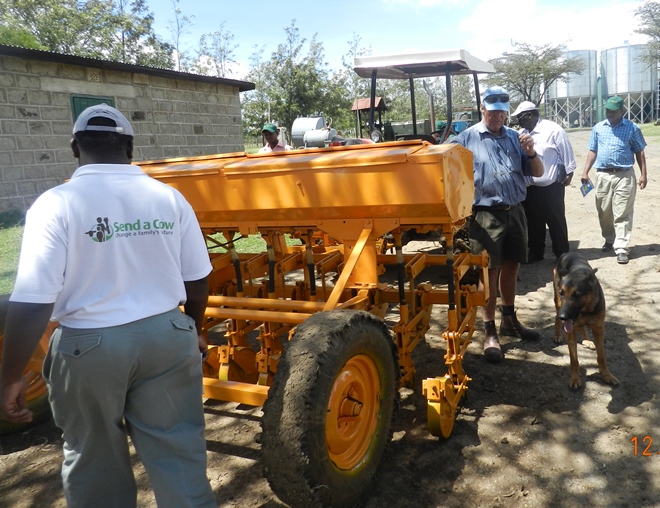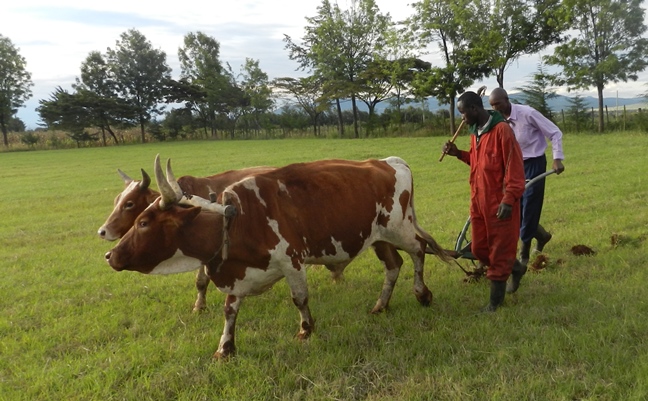

Capacity Building
- Strengthening of institutional, individual and community capacities for uptake and utilization of conservation agriculture
- Establishment and management of beneficial partnerships and strategic alliances
ACT engages in the promotion of learning about Conservation Agriculture (CA) and sustainable land management practices. This embraces curriculum development; development and distribution of training materials; actual training and training support for farmers and staff; Mentoring and Quality assurance. Every year ACT conducts both international and national CA training attracting participants from government, NGOs and private institutions. ACT also along the same line conducts tailor made training workshops for various organizations.
ACT capacity building programmes are carried out in order to provide skills and knowledge to its members, staff and partners from government, Non government institutions, private sector and farmers. ACT recognizes the fundamental goal of capacity building in order to enhance the abilities of stakeholders to evaluate and address crucial questions related to promotion of conservation agriculture technologies, policy dialogue and the process provides different choices of technological options for enhanced agricultural development.
ACT capacity building programmes are carried out in order to provide skills and knowledge to its members, staff and partners from government, Non government institutions, private sector and farmers. ACT recognizes the fundamental goal of capacity building in order to enhance the abilities of stakeholders to evaluate and address crucial questions related to promotion of conservation agriculture technologies, policy dialogue and the process provides different choices of technological options for enhanced agricultural development.
ACT is strengthening its regional and international commitment for capacity building by providing a strategic framework to the programme’ s capacity building activities for national governments and its members and partners in Africa.
ACT has used a wide range of approaches to build capacities, including training, formal education, capacity building projects and networking. The type of approach used by ACT has always depended on the specific objectives and partners’ needs to be achieved.
Other approach towards capacity building has been through policy dialogue, discussion workshops and regional meetings.
Capacity building helps ACT in achieving its goal by?
Equipping farmers with the principles and knowledge on Conservation Agriculture (CA) as the sustainable acceptable way of farming
Provide ACT stakeholders and partners with practical knowledge and skills in the application of CA practices for different socio-economic and agro-ecological environments to enable them to train and disseminate the CA technologies to farmers and players they work with.
Provide learners with approaches and methodologies for enhanced documentation and wide scale adoption of profitable Conservation Agriculture.
ACT capacity building focuses on extension agents, researchers, academia, farmers and policy makers. Our approaches are through workshops, seminars, farmers exchange visit, and agricultural fairs.
ACT offers (graduate) students and young professionals exposure and opportunity to gain hands on experience through practical engagement and supervision, it encourage and accommodate student attachments and internship where the arrangement is done on demand driven basis. These could be undertaken at various levels from the Secretariat headquarters, sub regional or attached to on-farm project level through partner implementing organizations.
- Equipping farmers with the principles and knowledge on Conservation Agriculture (CA) as the sustainable acceptable way of farming
- Provide ACT stakeholders and partners with practical knowledge and skills in the application of CA practices for different socio-economic and agro-ecological environments to enable them to train and disseminate the CA technologies to farmers and players they work with.
- Provide learners with approaches and methodologies for enhanced documentation and wide scale adoption of profitable Conservation Agriculture.
ACT capacity building focuses on extension agents, researchers, academia, farmers and policy makers. Our approaches are through workshops, seminars, farmers exchange visit, and agricultural fairs.
ACT offers (graduate) students and young professionals exposure and opportunity to gain hands on experience through practical engagement and supervision, it encourages and accommodates student attachments and internship where the arrangement is done on demand driven basis. These could be undertaken at various levels from the Secretariat headquarters, sub regional or attached to on-farm project level through partner implementing organizations.
By Saidi Mkomwa, African Conservation Tillage Network (ACT)
Efficiency, Inclusiveness, Resilience Hybrid Event: Register Here The Food and Agriculture Organization of the United Nations (FAO) is...
9th World Congress on Conservation Agriculture, Cape Town South Africa 24-27 June 2024
Sustainable Mechanization Innovations for economic growth of smallholders: Partnership with ACT-Africa
